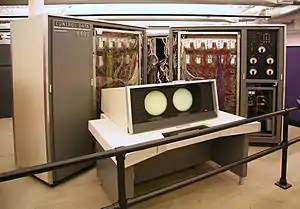60-bit computing
In computer architecture, 60-bit integers, memory addresses, or other data units are those that are 60 bits wide. Also, 60-bit central processing unit (CPU) and arithmetic logic unit (ALU) architectures are those that are based on registers, address buses, or data buses of that size.

| Computer architecture bit widths |
|---|
| Bit |
| Application |
| Binary floating-point precision |
| Decimal floating-point precision |
A 60-bit word is typically used for high-precision floating-point calculations; it can also store 10 6-bit characters.[1]
Examples
The only widely-used computers with 60-bit words were produced by Control Data Corporation (CDC),[2] including the CDC 6000 series,[3] the CDC 7600, and the CDC Cyber 70 and 170 series.[4] Though the addressable unit was the 60-bit word, instructions were either 15 or 30 bits.[3]
Early design documents for the IBM 7030 Stretch tentatively specified its word length as 60 bits; the final design used 64.[5]
Emulator
Museum examples of 60-bit CDC machines exist. There also exists an emulator for the series which will simulate the CDC 60-bit machines on commodity hardware and operating systems.[4]
References
- James L. Peterson, Computer Organization and Assembly Language Programming, 2014, ISBN 1483268594, p. 46
- Peterson; Concise Encyclopedia of Computer Science, 2004 ISBN 0470090952; Linda Null, Julia Lobur, Essentials of Computer Organization and Architecture, 2014, ISBN 1284033155; John Y. Hsu, Computer Architecture: Software Aspects, Coding, and Hardware, 2017, ISBN 1351836048
- "CDC 6000 Hardware". 60bits.net. Central Memory. Archived from the original on 28 February 2019. Retrieved 28 February 2018.
- "Welcome to cray-cyber.org - home of Cray Research and CDC computer". Desktop Cyber. Archived from the original on 28 February 2019. Retrieved 28 February 2018.
- Werner Buchholz, "Memory Word Length", STRETCH Memo no. 40, July 31, 1956, archived at the Computer History Museum